
Flatbed Trucks
HotShotTrucking.com can support your most demanding shipping requirements through customized flatbed trailer solutions designed for your specific freight.


EXPEDITED DELIVERY SOLUTIONS
Expedited Flatbed Trucking: Fast Ground Freight Solutions for Critical Shipments
Flatbed trucking is a cornerstone of the freight industry, providing the flexibility and strength needed to haul loads that simply wouldn’t fit in enclosed trailers. Unlike standard box trailers, flatbed trucks feature an open trailer bed with no walls or roof, enabling them to carry oversized, irregularly shaped, and bulky cargo that enclosed vans cannot accommodate.
This makes flatbed trucking essential for transporting heavy machinery, construction materials, industrial equipment, and other large freight. In the context of expedited ground freight, flatbed trucking shines by combining speed and capacity – ensuring even the largest urgent shipments can be delivered quickly and safely.
Expedited flatbed trucking services focus on time-critical deliveries. When every minute counts, shippers turn to hot shot trucking providers like HotShotTrucking.com to pick up freight at a moment’s notice and drive straight through to the destination. Expedited freight shipping via flatbed truck often achieves same-day or next-day delivery, covering hundreds or even thousands of miles without the delays of hub transfers.
Flatbed trucking isn’t only about speed – it’s also about capability. A flatbed trailer truck (typically a semi-truck pulling a flatbed trailer) can measure 48 to 53 feet in length and handle up to 48,000 pounds of freight. These flatbed trailer capacities allow shippers to move large machinery, stacks of lumber, steel beams, oversized containers, and other heavy freight in one go. With these benefits, it’s no surprise that flatbed trucks make up a significant portion of commercial trucking and remain in high demand for urgent freight needs.
Request a Quote Now
Add your shipment details below, and one of our professional expeditors will contact you within minutes. For immediate assistance on an urgent quote, call (800) 604-2511 with these details handy.
Our expedited ground network operates around the clock across the U.S., Canada, and Mexico, ready to dispatch a truck at any time.
Dedicated door-to-door service – your freight is the only cargo on the truck, with no intermediate stops or transfers.
Equipment ranges from sprinter vans and box trucks up to 53′ dry van trailers, handling loads from a single pallet to a full truckload.
Real-time GPS tracking and a single point of contact keep you constantly updated on your shipment’s progress.
Urgent Trucking Services with HotShotTrucking.com for Fast, Reliable Shipping.
KEY BENEFITS
Tap into our coast-to-coast flatbed capacity for time-critical, over-dimensional, and heavy freight.
HotShotTrucking.com delivers the same best-in-class performance, coordinated logistics, real-time tracking, and customer service for standard flatbeds, step-decks, double-drops, and RGNs as we do across all ground and air solutions.
Our integrated network gives you the widest range of options from a single source: if your ground transit won't work, we escalate to dedicated air charter and coordinate seamless handoffs to/from flatbed equipment.
EXPLORE OUR COVERAGEGain peace of mind with a dedicated flatbed expediter who owns your shipment end-to-end.
From load plan and securement strategy (chains/straps, dunnage, tarps) to route design and in-transit updates, you work with the same specialist from dispatch through delivery. Your freight is critical to your operation—so it’s critical to us.
Whether you’re moving machinery, steel, pipe, or site equipment, your SPOC coordinates drivers, permits, escorts, and site requirements to keep everything on schedule and fully transparent.
MEET THE TEAM
Our 24/7 expediters engineer the optimal flatbed configuration for your lane and deadline.
Standard 48'/53' flatbeds for general oversized loads, step-decks for added height clearance, double-drops/RGNs for tall or ultra-heavy equipment, and hot-shot goosenecks for agile, shorter-haul rush jobs.
With assets and partners positioned across the U.S. (and in Canada and Mexico), we can dispatch near your pickup point—often within hours—so your shipment rolls immediately with the right equipment and securement.
VIEW ALL SERVICES
Our expediting team specializes in urgent, complex flatbed moves.
Drawing on thousands of time-critical shipments, we anticipate challenges—weather, curfews, construction, height/weight restrictions—and re-route in real time to protect your timeline.
You can reach us 24/7/365; there’s always a seasoned pro ready to jump in, secure capacity, optimize the route, manage permits/escorts, and handle any in-transit hiccups. Continuous tracking and proactive status updates keep your team informed from first mile to final offload.
LEARN MOREFlatbed Truck Advantages
- Flatbed Manufacturers
- Specs and Capabilities
- Rapid Response and Delivery Speed
- Access to Remote and Difficult Job Sites
- Cost-Effective for Heavy Urgent Loads
- Minimized Downtime and Improved Continuity
Flatbed Manufacturers
There are several flatbed trailer manufacturers in the US, including types built by Great Dane, MAC, Wabash, Reitnouer, Stoughton, and Utility. This class of truck and trailer combination is extremely versatile and can carry some of the heaviest freight on the road when compared to any other type of truck or van. As a premier third-party logistics provider (3PL), the experienced expeditors at HotShotTrucking.com know when an expedited flatbed trailer (and which kind) is the best option for your next time-sensitive shipment – and even those that aren’t. There are many reasons why your next shipment might end up on a flatbed trailer, so let’s look at what makes these trailers so capable and how HotShotTrucking.com can help you with your most urgent shipping needs.
Specs and Capabilities
So what is a flatbed trailer? In its simplest form, a flatbed truck and trailer combination consists of a typical semi-truck tractor, and a flat trailer with no sides or roof which carries the freight. A basic flatbed trailer runs between 48 to 53 feet long, 102” wide and 110” high, and has up to six axles. Unlike 53 ft. dry vans, flatbed trailers are completely open and exposed to outside temperatures and weather, making it slightly more difficult – but not impossible – to protect freight from the elements.
The typical 53 ft tractor trailer has a load capacity of up to 48,000 pounds (although this can vary between flatbed types) providing significant economies-of-scale for any shipment. The height of cargo that can be loaded onto a flatbed varies depending on the type of flatbed trailer and its bed height. In general, the overall height of the trailer and cargo must not exceed 162 inches. A typical flatbed trailer is 5 feet off the ground, and uses a combination of lumber, steel tarps, winch straps, transport chains, and binders to safely secure the cargo. As long as your freight is not hazardous, perishable, or temperature sensitive, a 53 ft. flatbed trailer is an excellent option for expedited cross-country, inter-state, and even intra-state transportation.
Rapid Response and Delivery Speed
Flatbed trucking combined with expedited service means your freight moves as quickly as possible. The moment you confirm a shipment, a driver is dispatched immediately – there’s no waiting to consolidate loads or fit into a preset schedule. The truck travels directly from pickup to drop-off, often enabling same-day or overnight delivery for regional distances.
This speed is especially beneficial for emergency shipments or just-in-time supply chains. By driving straight through with minimal stops, expedited flatbed services minimize transit time and meet tight deadlines. For shippers, this rapid response can be a lifesaver when unexpected supply or production issues arise and critical parts or materials must arrive without delay.
Access to Remote and Difficult Job Sites
Flatbed trucks have the ruggedness and maneuverability to reach places that standard semi-trailers might struggle with. Many flatbed setups use heavy-duty pickup trucks or shorter wheelbase tractors, which can navigate rural roads, construction sites, oilfields, and tight urban job sites with greater ease. This makes flatbed trucking ideal for delivering to remote or hard-to-reach locations. For example, in the oil and gas industry, equipment often needs to reach drilling sites far off the highway; in construction, materials might be delivered directly to an undeveloped lot or high-rise site.
A flatbed can often get closer to the point of use, and because it can be loaded/unloaded from the side, you don’t need a loading dock. Expedited flatbed services leverage this capability to save time – your shipment goes straight to its end location, not just the nearest distribution center. By reaching remote sites quickly, flatbed trucks help industries avoid the extra step of rehandling freight onto smaller vehicles and keep field operations running smoothly.
Cost-Effective for Heavy Urgent Loads
When time is short, air freight is often considered – but it’s extraordinarily expensive for large, heavy items (and not always feasible for very bulky cargo). Expedited ground transportation with flatbed trucks offers a more cost-effective alternative to air freight for urgent shipments. Flatbed trucking companies can often deliver in a similar time frame over medium distances (for example, overnight deliveries within a region or next-day cross-country) at a fraction of the cost of chartering a cargo plane.
This is especially true for freight that is heavy or not suitable for aircraft due to size or handling requirements. By using ground expedited services, shippers strike the ideal balance between speed and budget. Your critical shipment still arrives quickly, but you avoid the extreme costs associated with air transport. In many cases, the return on investment is clear: a relatively modest premium for expedited trucking secures on-time delivery and prevents far more costly downtime or project delays.
Minimized Downtime and Improved Continuity
Perhaps the biggest advantage of expedited flatbed trucking is how it helps businesses avoid costly downtime. When a critical machine part breaks or a key material runs out, every hour of lost production or halted work can cost thousands or even millions in some industries. Flatbed trucking provides a lifeline in these scenarios by rushing replacement parts, equipment, or supplies directly to the site before a short stoppage turns into a major shutdown. By swiftly delivering what's needed to get operations back on track, expedited flatbed services protect your business continuity. The cost of the rush delivery is often trivial compared to the revenue lost during extended downtime.
In manufacturing, for instance, getting a heavy replacement motor delivered overnight on a flatbed could save a production line from sitting idle. In construction, expedited delivery of steel beams or components keeps projects on schedule. Preventing delays and reducing idle time delivers a strong ROI and often makes expedited flatbed shipping a strategic tool for staying competitive and keeping customers satisfied.
Flatbed Trailer Types
There are several different types of flatbed trailers, and each one has its advantages for certain kinds of freight. The experienced expeditors at HotShotTrucking.com take all of these factors into consideration when deciding if a flatbed trailer – and which kind – is the best option for your shipment.
Lowboy Trailers
Step Deck Trailers
Stretch Double Drop Trailers
Sidekit Trailers
Removeable Gooseneck Trailers
Conestoga Trailers
Industries That Rely on Flatbed Trucking

Oil & Gas
Energy companies rely on expedited flatbed trucking to move drilling equipment, pipelines, pumps, and replacement parts to remote oilfields and natural gas sites. A hot shot flatbed truck can haul in the new part quickly to minimize production downtime. Flatbeds also transport long sections of pipe, rig components, and bulk materials.

Technology
The technology sector often entails physical infrastructure that can be large and delicate – making flatbed expedited transport invaluable. Data center companies may need to ship oversize IT hardware on flatbeds for rapid deployment to facilities. Telecom providers use flatbed trucks to quickly deliver cell tower components.

Automotive
The automotive industry runs on just-in-time supply chains, which means a delayed part can shut down an assembly line. When a production line is stalled due to a missing component, every hour of downtime is costly. We’ve rushed tiny but essential electronics, engine components, and tooling equipment directly to factories.
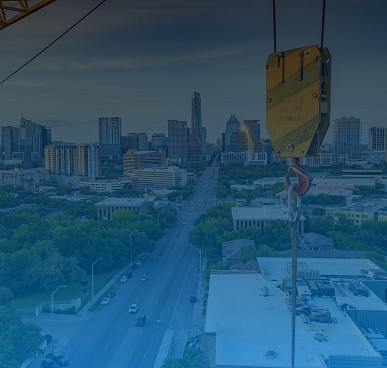
Construction
The construction sector uses flatbed trucking constantly to ship building materials and machinery. Expedited flatbed services might deliver steel beams, trusses, lumber, concrete forms, or heavy equipment (like excavators and generators) to job sites on tight deadlines. An overnight flatbed shipment can keep the schedule on track.

Manufacturing
Factories often need to source large replacement parts or machine components at a moment’s notice to avoid a line shutdown. Whether it’s an automotive plant awaiting a gigantic stamping press part or a food processing facility needing a new industrial boiler delivered, flatbed trucks can haul these outsized items directly to the plant fast.

Aerospace & Defense
Flatbed trucks are used to haul large aircraft parts – such as engines, wing sections, or landing gear – between production facilities, testing sites, and airports. When an aircraft is grounded (AOG – Aircraft on Ground) waiting for a part, every hour counts; an expedited flatbed can move a jet engine or fuselage section directly to the hangar.
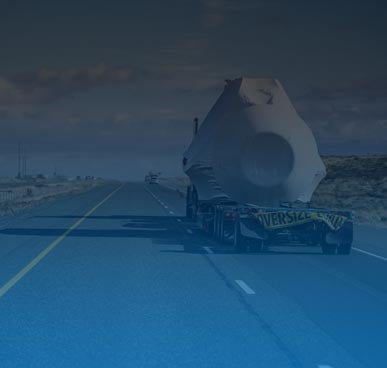
Machinery
Manufacturers and distributors rely on expedited flatbed services to deliver oversized engines, presses, boilers, or assembly-line components directly to factories and worksites, often using cranes or forklifts for loading. The open design of flatbeds allows for fast, flexible handling and secure transport of machinery equipment.
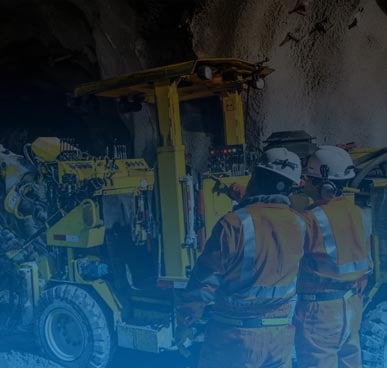
Mining
The mining industry depends on flatbed trucking to move massive machinery, drill rigs, conveyor sections, and oversized replacement parts to remote sites. Flatbeds are especially valuable in mining because they can handle extreme weight, unusual dimensions, and the rugged access roads common at quarries and mines.
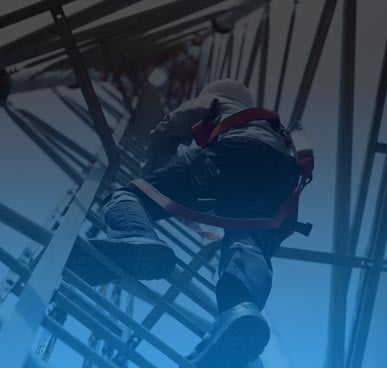
Telecommunications
Telecommunications projects use flatbed trucks to transport large-scale infrastructure components such as cell towers, satellite dishes, fiber-optic cable spools, and backup power systems. These items are often oversized and require direct-to-site delivery on tight schedules, especially during network expansions or emergency repairs.
Ground Transportation and Expedited Trucking Services
Explore Our Resource and Blog Section
HotShotTrucking.com is a trusted authority in the expedited freight industry, recognized for our reliability and operational efficiency. Access industry insights, expert advice, and resources to enhance your logistics strategies and maintain optimal operational flow.

Hot Shot Trucking and the Stargate AI Data Center in Abilene, Texas
The Stargate data center project in Abilene, Texas is nothing short of historic. Announced in early 2025 by a joint venture of OpenAI, SoftBank, and Oracle, the project aims to invest up to $500 billion in U.S. artificial intelligence infrastructure and was touted to create over 100,000 jobs nationwide.
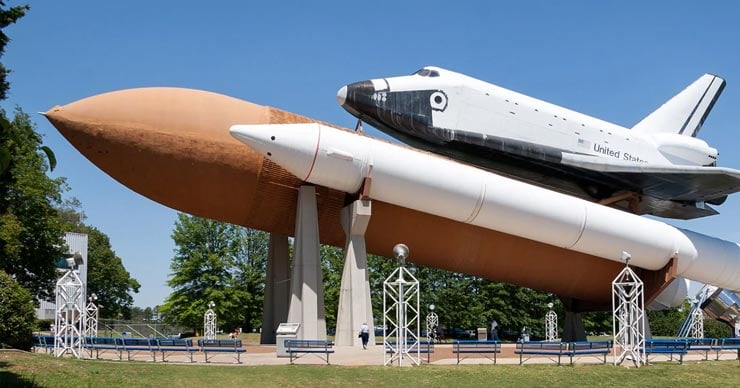
Space Command Huntsville: The Role of Expedited Freight
The decision to base the U.S. Space Command headquarters in Huntsville, Alabama – known as “Rocket City” – marks a pivotal moment for both national defense and the local economy.
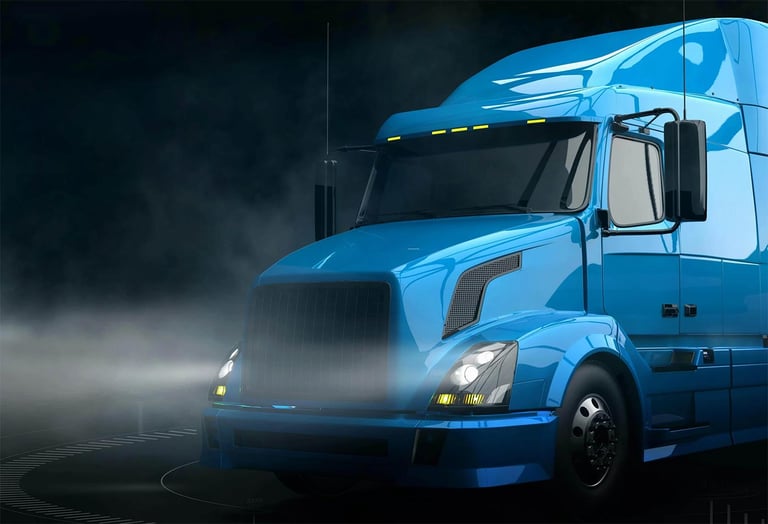
What is Hot Shot Trucking?
Hot shot trucking is a specialized freight service focused on speed, flexibility, and delivering time-critical hot shot loads. Hot shot trucking services involves hauling smaller, urgent shipments on short notice and delivering them directly to their destination as fast as possible.

Houston Hot Shot Delivery
Houston’s position as a national energy hub means urgent shipping needs are commonplace. When a critical piece of equipment fails in an oilfield or at a refinery, hot shot delivery services become a supply-chain lifeline for the Houston economy.

Hot Shot Trucking for the Oil Industry
Hot shot trucking originated in the oil and gas industry. It was a response to the need for rapid transport of time-sensitive materials to remote drilling sites. Today, it plays a critical role in the logistics of the oil and gas sector.
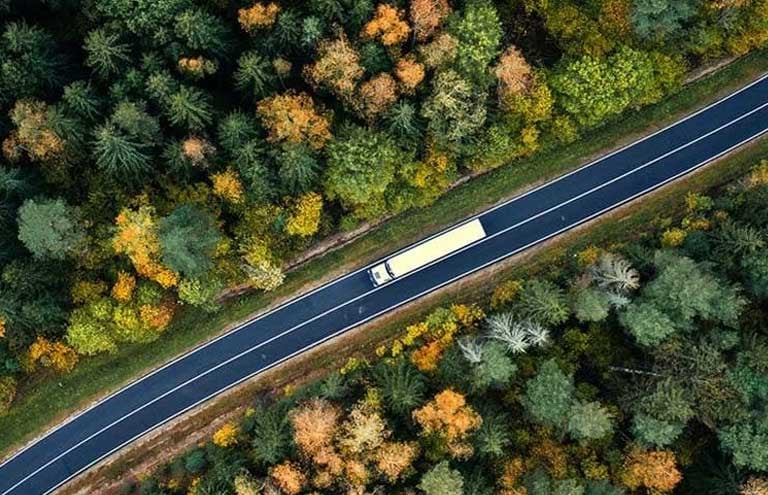
Understanding Full Truckload Services (FTL)
Full Truckload (FTL) services have solidified their place as a vital shipping solution for expedited freight. With the trucking industry powering over 70% of the nation’s freight, FTL stands out as a key service that helps to ensure supply chains operate seamlessly.
Work with a Dedicated Single Point of Contact
To streamline your experience, we establish a single point of contact (SPOC) for every shipment. Instead of being passed around a call center, you have one dedicated expediter who oversees your load from quote through delivery.
Whether you’re placing a new order or monitoring an ongoing delivery, your single point of contact keeps the communication channel open and efficient. You’ll always know exactly where your flatbed shipment is and when to expect delivery, allowing you to plan your operations with confidence.

Hi, I'm Steve
Reach out today and let's solve your urgent shipping needs. I or a member of the team will be with you from start to finish.

Wherever You Need Us, You'll Find Us
We're proud to serve customers across the United States with custom shipping solutions designed to meet urgent needs. Browse by state to view services in your area.
AREAS WE SERVICEAlabama
(205) 453-1955
 Alabama
Alabama
Centered around Birmingham, Huntsville, and Mobile, Alabama is known for aerospace, automotive, and advanced manufacturing. Its competitive business climate and skilled workforce support efficient operations and long-term investment.
Hot Shot Trucking AlabamaAlaska
(907) 331-6911
 Alaska
Alaska
Alaska’s location supports time-sensitive shipments for oil, fishing, and remote resource development. We offer custom shipping and delivery access through Anchorage, Fairbanks, and coastal hubs.
Hot Shot Trucking AlaskaArizona
(623) 252-0101
 Arizona
Arizona
Phoenix, Tucson, and Mesa anchor Arizona’s expanding economy, with strengths in technology, aerospace, and clean energy. A business-friendly environment and consistent population growth attract a range of enterprises.
Hot Shot Trucking ArizonaArkansas
(314) 269-1222
 Arkansas
Arkansas
Little Rock and Fayetteville support Arkansas’s economy, known for its concentration in retail, agriculture, and transportation. The state’s central location and affordable business costs appeal to companies serving national markets.
Hot Shot Trucking ArkansasCalifornia
(323) 648-3500
 California
California
Explore time-critical shipping coverage across Los Angeles, San Francisco, San Diego, and the Central Valley. California leads the nation in technology, entertainment, agriculture, and global trade connections.
Hot Shot Trucking CaliforniaColorado
(720) 262-8998
 Colorado
Colorado
Denver, Boulder, and Colorado Springs contribute to Colorado’s strengths in aerospace, software development, and outdoor recreation. A well-educated population and strong quality of life continue to draw new businesses.
Hot Shot Trucking ColoradoConnecticut
(203) 936-6655
 Connecticut
Connecticut
Explore reliable delivery services for finance, insurance, and biotech sectors in Hartford, Stamford, and New Haven. Connecticut’s position between New York and Boston provides direct access to Northeast economic hubs.
Hot Shot Trucking ConnecticutDelaware
(302) 504-6044
 Delaware
Delaware
Wilmington leads Delaware’s activity in finance, pharmaceuticals, and corporate services. Its streamlined incorporation process and favorable legal framework attract many national and international businesses.
Hot Shot Trucking DelawareDistrict of Columbia
(202) 644-8833
 District of Columbia
District of Columbia
Located in the heart of the nation's capital, our Washington, D.C. hub specializes in urgent and highly sensitive shipments. We provide rapid delivery for government contractors and professional services firms, ensuring your cargo arrives securely and on time in this critical market.
Hot Shot Trucking DCFlorida
(786) 231-6700
 Florida
Florida
Florida’s major metros, Miami, Orlando, and Tampa, support thriving sectors like tourism, aerospace, and international trade. The state’s coastal access and tax-friendly policies are major draws for businesses of all sizes.
Hot Shot Trucking FloridaGeorgia
(678) 288-5005
 Georgia
Georgia
With Atlanta, Savannah, and Augusta as key centers, Georgia is recognized for its contributions to film, manufacturing, and transportation. A well-connected infrastructure and growing tech scene make it a strong option for expansion.
Hot Shot Trucking GeorgiaHawaii
(808) 845-4577
 Hawaii
Hawaii
Honolulu anchors Hawaii’s economy, which includes tourism, defense, and sustainable agriculture. Its location in the Pacific enables unique access to Asian markets and renewable energy development.
Hot Shot Trucking HawaiiIdaho
(208) 577-6233
 Idaho
Idaho
Boise, Twin Falls, and Idaho Falls are central to Idaho’s growing sectors in agriculture, food processing, and tech. A low cost of living and supportive business policies encourage entrepreneurship and relocation.
Hot Shot Trucking IdahoIllinois
(773) 966-2800
 Illinois
Illinois
Statewide shipping access, from Chicago to Springfield, supports manufacturing, agriculture, and related operations. Illinois offers a large talent base and strong connections to both national and global markets.
Hot Shot Trucking IllinoisIndiana
(317) 800-7222
 Indiana
Indiana
Indianapolis, Fort Wayne, and Evansville contribute to Indiana’s manufacturing, life sciences, and agriculture industries. A central U.S. location and stable regulatory environment support long-term business growth.
Hot Shot Trucking IndianaIowa
(515) 954-7522
 Iowa
Iowa
Explore reliable shipping and delivery services in Des Moines, Cedar Rapids, and Davenport for agricultural products, insurance documents, and machinery. Iowa combines rural productivity with strong financial and tech sectors.
Hot Shot Trucking IowaKansas
(316) 633-7000
 Kansas
Kansas
Kansas City, Wichita, and Topeka anchor Kansas’s industries in aviation, bioscience, and renewable energy. Low operational costs and a central geographic position benefit businesses with national reach.
Hot Shot Trucking KansasKentucky
(502) 230-4444
 Kentucky
Kentucky
Learn about custom delivery support for bourbon, healthcare products, and auto parts in Louisville, Lexington, and Bowling Green. Kentucky’s distribution networks and manufacturing legacy make it ideal for time-sensitive shipping.
Hot Shot Trucking KentuckyLouisiana
(504) 613-6666
 Louisiana
Louisiana
New Orleans, Baton Rouge, and Shreveport shape Louisiana’s focus on energy, shipping, and chemical production. Its access to the Gulf of Mexico and established port infrastructure offer critical trade advantages.
Hot Shot Trucking LouisianaMaine
(978) 662 - 2214
 Maine
Maine
Serving Portland, Bangor, and Augusta, we offer delivery options for marine products, healthcare, and specialty goods. Maine offers natural access to Canadian and Atlantic markets along with a strong quality-of-life appeal.
Hot Shot Trucking MaineMaryland
(800) 604-2511
 Maryland
Maryland
Baltimore, Bethesda, and Frederick contribute to Maryland’s strengths in cybersecurity, biotech, and defense. Its proximity to federal agencies and top research institutions supports innovation and investment.
Hot Shot Trucking MarylandMassachusetts
(617) 934-7800
 Massachusetts
Massachusetts
Supporting urgent deliveries in Boston, Cambridge, and Worcester, we ship pharmaceuticals, higher education, and R&D-driven goods. Massachusetts offers access to top-tier universities and leading-edge innovation hubs.
Hot Shot Trucking MassachusettsMichigan
(313) 887-0577
 Michigan
Michigan
Detroit, Grand Rapids, and Ann Arbor form the backbone of Michigan’s automotive, mobility, and manufacturing sectors. A deep talent pool and commitment to innovation attract investment in advanced industries.
Hot Shot Trucking MichiganMinnesota
(763) 273-5444
 Minnesota
Minnesota
Explore custom delivery services for medical devices, retail, and food manufacturing across Minneapolis, St. Paul, and Rochester. Minnesota combines innovation with a strong corporate presence and a skilled labor force.
Hot Shot Trucking MinnesotaMississippi
(769) 553-4413
 Mississippi
Mississippi
Jackson, Gulfport, and Hattiesburg support industries like shipbuilding, agriculture, and manufacturing. Mississippi offers affordable business conditions and strategic access to southern U.S. markets.
Hot Shot Trucking MississippiMissouri
(314) 269-1222
 Missouri
Missouri
Learn about shipping support across St. Louis, Kansas City, and Springfield for food processing, healthcare products, and life sciences. Missouri’s location and infrastructure support regional delivery and national service coverage.
Hot Shot Trucking MissouriMontana
(800) 604-2511
 Montana
Montana
Billings, Missoula, and Bozeman are central to Montana’s economy, which includes energy, agriculture, and tourism. The state offers wide open space, natural resources, and room for innovative rural development.
Hot Shot Trucking MontanaNebraska
(402) 909-0200
 Nebraska
Nebraska
Omaha, Lincoln, and Grand Island support Nebraska’s activity in finance, agriculture, and manufacturing. Its central location and skilled labor force provide dependable conditions for growth.
Hot Shot Trucking NebraskaNevada
(702) 583-6200
 Nevada
Nevada
Las Vegas, Reno, and Henderson shape Nevada’s economy in hospitality, mining, and clean energy. The state’s tax structure and rapid population growth contribute to ongoing economic momentum.
Hot Shot Trucking NevadaNew Hampshire
(603) 782-0333
 New Hampshire
New Hampshire
Manchester, Nashua, and Concord are economic hubs in New Hampshire, supporting healthcare, manufacturing, and tech. The state combines access to Boston markets with a lower tax burden.
Hot Shot Trucking New HampshireNew Jersey
(862) 236-3116
 New Jersey
New Jersey
Newark, Jersey City, and Princeton support New Jersey’s diverse economy in pharmaceuticals, finance, and logistics. Its proximity to major East Coast metros and deep talent base attract both startups and global firms.
Hot Shot Trucking New JerseyNew Mexico
(505) 886-0622
 New Mexico
New Mexico
New Mexico’s key cities, including Albuquerque, Santa Fe, and Las Cruces, help drive energy, aerospace, and scientific research. The state’s open land and national labs support innovation in advanced industries.
Hot Shot Trucking New MexicoNew York
(347) 514-9999
 New York
New York
New York City, Buffalo, and Albany shape a broad economy in finance, media, and health sciences. With access to global markets and deep institutional resources, New York is a leader in commerce and innovation.
Hot Shot Trucking New YorkNorth Carolina
(919) 800-0339
 North Carolina
North Carolina
Charlotte, Raleigh, and Durham contribute to North Carolina’s leadership in banking, biotech, and manufacturing. A growing talent pool and strong research universities attract long-term investment.
Hot Shot Trucking North CarolinaNorth Dakota
(701) 212-1922
 North Dakota
North Dakota
North Dakota’s energy, agriculture, and technology sectors are supported by the state's metro areas, including Fargo, Bismarck, and Grand Forks. Low unemployment and stable growth create a welcoming climate for business development.
Hot Shot Trucking North DakotaOhio
(330) 648-0515
 Ohio
Ohio
Covering major cities like Columbus, Cleveland, and Cincinnati with tailored shipping solutions and reliable delivery networks. Ohio offers central access to the Midwest with leading industries in healthcare, manufacturing, and finance.
Hot Shot Trucking OhioOklahoma
(405) 445-7505
 Oklahoma
Oklahoma
Providing custom shipping options throughout Portland, Eugene, and Salem, we deliver advanced tech and sustainable goods. Oregon's economy thrives on innovation in technology, clean energy, and advanced manufacturing.
Hot Shot Trucking Oklahoma
![]() Oregon
Oregon
With Portland at the forefront, Oregon has built a reputation for innovation in green energy, advanced manufacturing, and software. Its commitment to sustainability and quality of life draws both startups and global brands.
Hot Shot Trucking OregonPennsylvania
(215) 989-4444
 Pennsylvania
Pennsylvania
Supporting urgent deliveries and time-critical shipments includes cities such as Philadelphia, Pittsburgh, and Harrisburg. Pennsylvania connects East Coast markets with strengths in education, healthcare, and industrial manufacturing.
Hot Shot Trucking PennsylvaniaRhode Island
(800) 604-2511
 Rhode Island
Rhode Island
Fast, flexible shipping supports marine products, healthcare, and design goods in Providence, Warwick, and Newport. Rhode Island’s coastal access and dense regional network support creative and technical industries.
Hot Shot Trucking Rhode IslandSouth Carolina
(803) 403-9055
 South Carolina
South Carolina
Custom shipping and delivery supports auto parts, aerospace components, and industrial goods in Charleston, Columbia, and Greenville. The state is known for its growing role in advanced manufacturing and exports.
Hot Shot Trucking South CarolinaSouth Dakota
(701) 212-1922
 South Dakota
South Dakota
Reliable delivery services operate in Sioux Falls, Rapid City, and beyond for agriculture, finance, and light manufacturing. South Dakota attracts business with no corporate income tax and a stable economic environment.
Tennessee
(615) 970-7100
 Tennessee
Tennessee
Time-critical shipping solutions serve Nashville, Memphis, and Knoxville for healthcare, automotive, and music-related goods. Tennessee offers access to key Southern markets with strong infrastructure and workforce programs.
Hot Shot Trucking TennesseeTexas
(972) 330-2000
 Texas
Texas
Custom shipping solutions for construction, manufacturing, oil & gas, and more support major cities, including Dallas and Austin. Enjoy Texas’ business-friendly climate, no state income tax, and prime location.
Hot Shot Trucking TexasUtah
(801) 784-1444
 Utah
Utah
Salt Lake City, Provo, and Ogden handle urgent shipments for the tech, finance, and recreation industries. Utah combines rapid economic growth with a skilled, youthful workforce and a strong startup culture.
Hot Shot Trucking UtahVermont
(800) 604-2511
 Vermont
Vermont
Burlington and the surrounding areas support efficient delivery services for specialty foods, renewable energy systems, and small-scale manufacturing. Vermont promotes sustainability, community-based business, and green innovation.
Hot Shot Trucking VermontVirginia
(804) 886-3100
 Virginia
Virginia
Richmond, Virginia Beach, and Arlington offer streamlined shipping and delivery access for defense, cybersecurity, and maritime goods. Virginia’s proximity to D.C. and educated workforce support both public and private sector growth.
Hot Shot Trucking VirginiaWashington
(206) 673-2900
 Washington
Washington
Seattle, Tacoma, and Spokane provide fast delivery and custom shipping for aerospace parts, tech products, and agricultural exports. Washington combines West Coast market access with a deep culture of innovation.
West Virginia
(804) 886-3100
 West Virginia
West Virginia
Charleston, Morgantown, and Huntington offer shipping options for energy, chemical, and forestry-related goods. West Virginia’s natural resources and infrastructure investments support long-term business activity.
Hot Shot Trucking West VirginiaWisconsin
(414) 973-8000
![]() Wisconsin
Wisconsin
Milwaukee, Madison, and Green Bay offer statewide shipping solutions for dairy, heavy equipment, and medical products. Wisconsin is known for its industrial strength and commitment to workforce development.
Hot Shot Trucking WisconsinWyoming
(800) 604-2511
 Wyoming
Wyoming
Cheyenne, Casper, and surrounding regions provide custom shipping support for energy and natural resource projects. Wyoming offers tax advantages and wide-open space for growing operations in mining, ranching, and energy.
Hot Shot Trucking WyomingThe Right Capacity Is Key to Every Urgent Shipment
Your urgent shipment will be the only freight in the sprinter van, box truck, straight truck, hot shot truck, 53’ dry van, or full flatbed to minimize damage and ensure the shipment goes direct from pickup to delivery.
FULL FLATBED
AirFreight.com's network of full flat bed vehicles can accommodate wide or mega-size loads, such as specialized equipment machinery of all weights and sizes. Measuring 48-53’ x 102” x 102”, full flat bed vehicles can carry freight of up to 48,000 pounds.
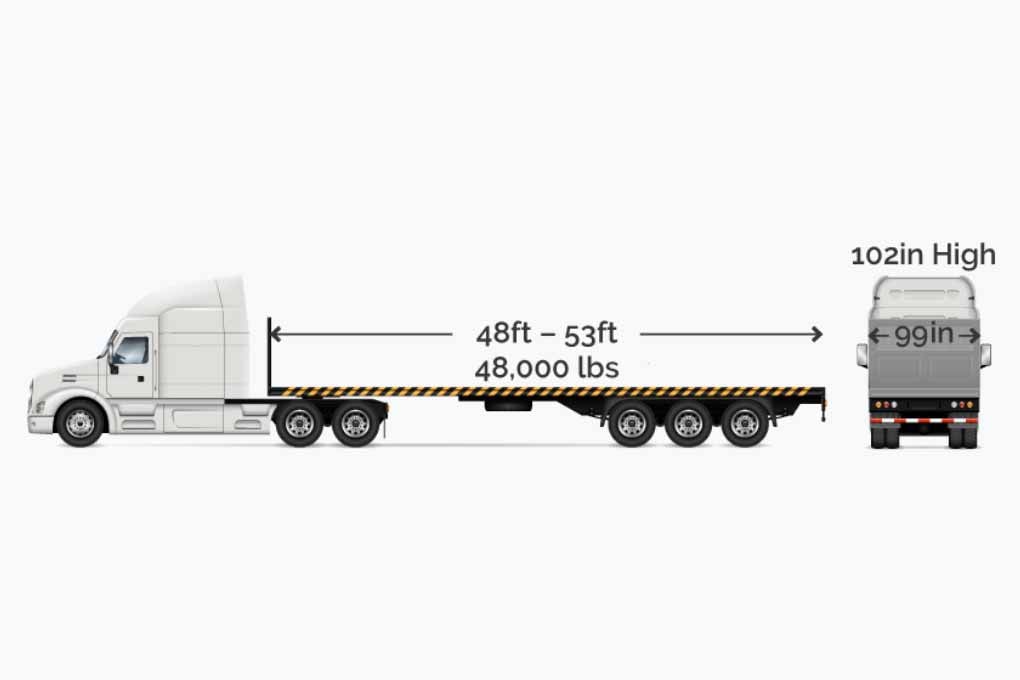
#1
5/5
50000
24/7
SPRINTER VAN
AirFreight.com's network of expedited Sprinter vans have the capacity to meet your local, regional, or long-distance ground shipping needs. Measuring 8-12’ x 52” x 70", our carefully-selected vans have the capacity to carry loads up to 3,000 lbs.
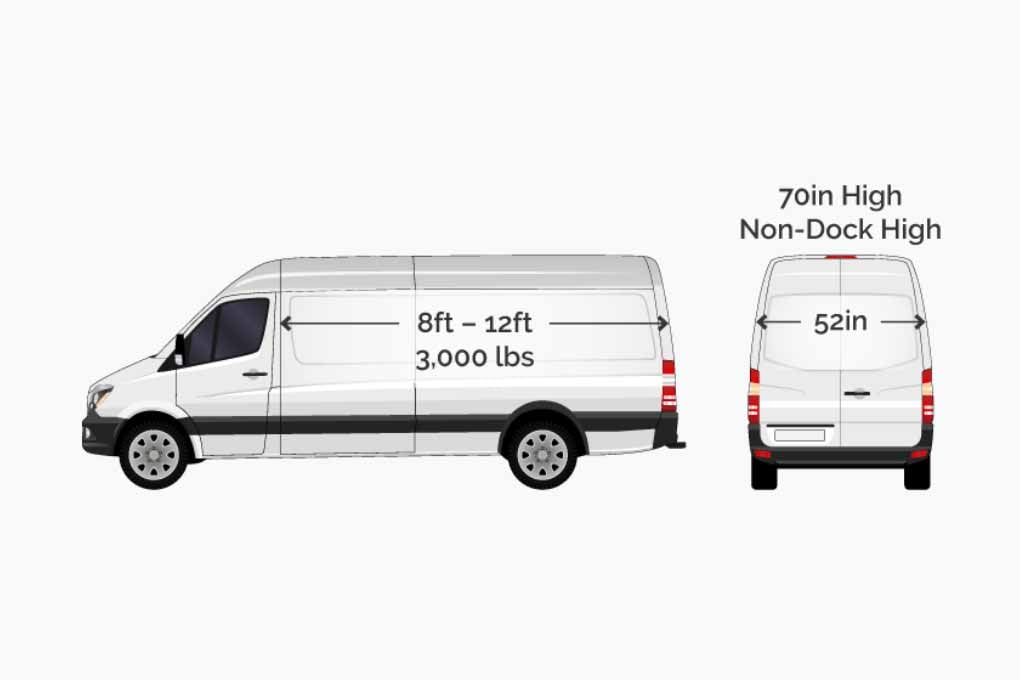
#1
5/5
50000
24/7
BOX TRUCK
We pride ourselves in working with trusted partners that offer carefully-vetted box trucks, from lift-gate service to varying sizes that accommodate smaller loads. Box trucks, or small straight trucks, measure 12-16’ x 94” x 70” and have the capacity to carry up to 5,000 pounds.
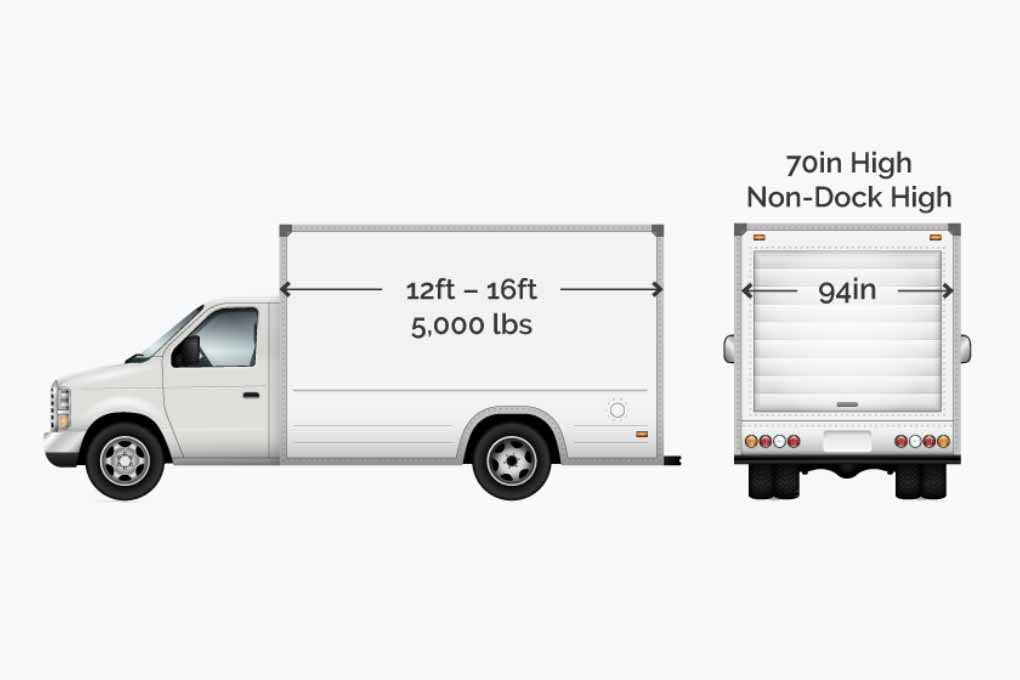
#1
5/5
50000
24/7
STRAIGHT TRUCK
Measuring 22-26’ x 96” x 96”, straight trucks can carry loads up to 9,000 pounds. Large straight truck services offer focused logistics, professional drivers, and deeply-experienced expeditors to get your delivery where it needs to go.
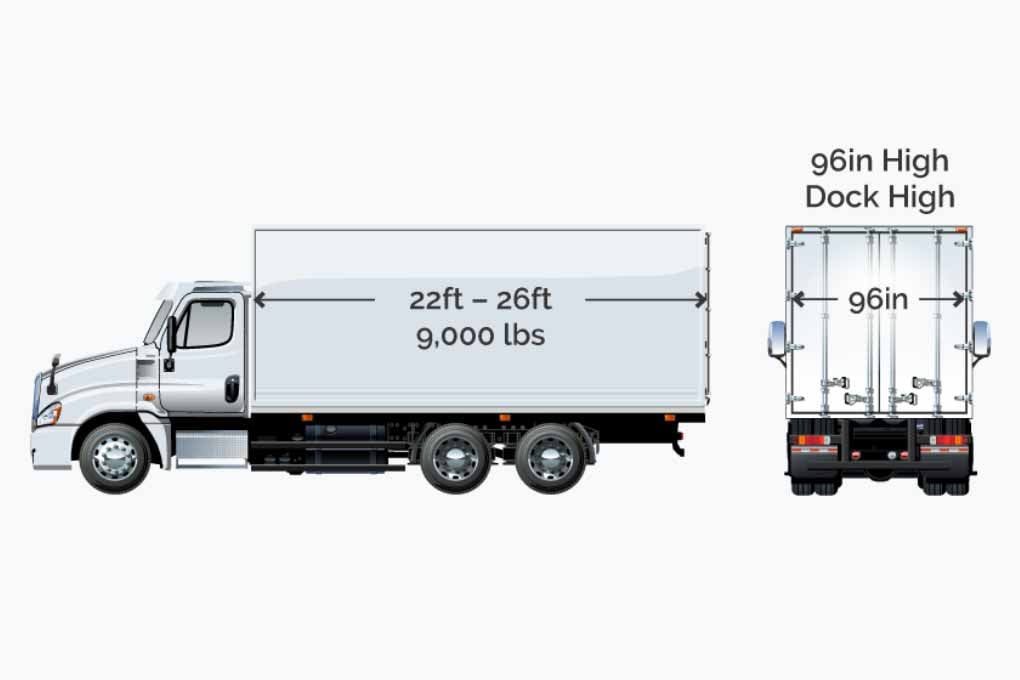
#1
5/5
50000
24/7
53' DRY VAN
Our premium network of 53-ft dry vans can carry loads up to 42,000 pounds. Measuring 53’ x 99” x 102”, these carefully-vetted vehicles will ensure your time-sensitive freight arrives at its destination safely.
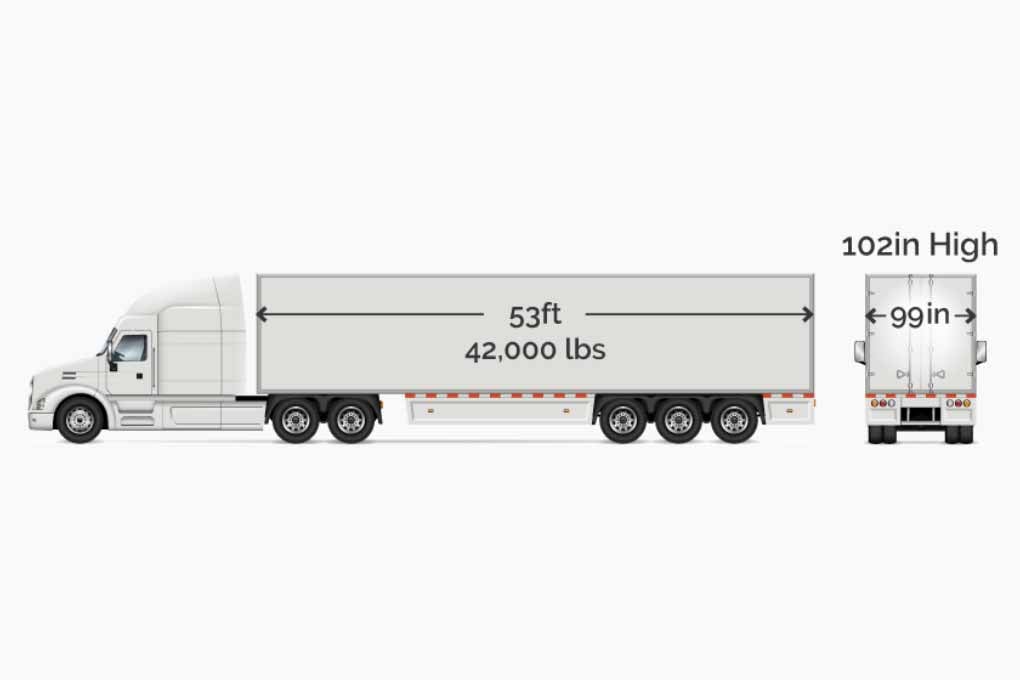
#1
5/5
50000
24/7
HOT SHOT TRUCK
We'll happily arrange for your freight to be transported via hot shot trucking services. We've proudly partnered with hot shot trucking providers across North America to give you access to carefully-vetted ground delivery vehicles for your time-critical freight.
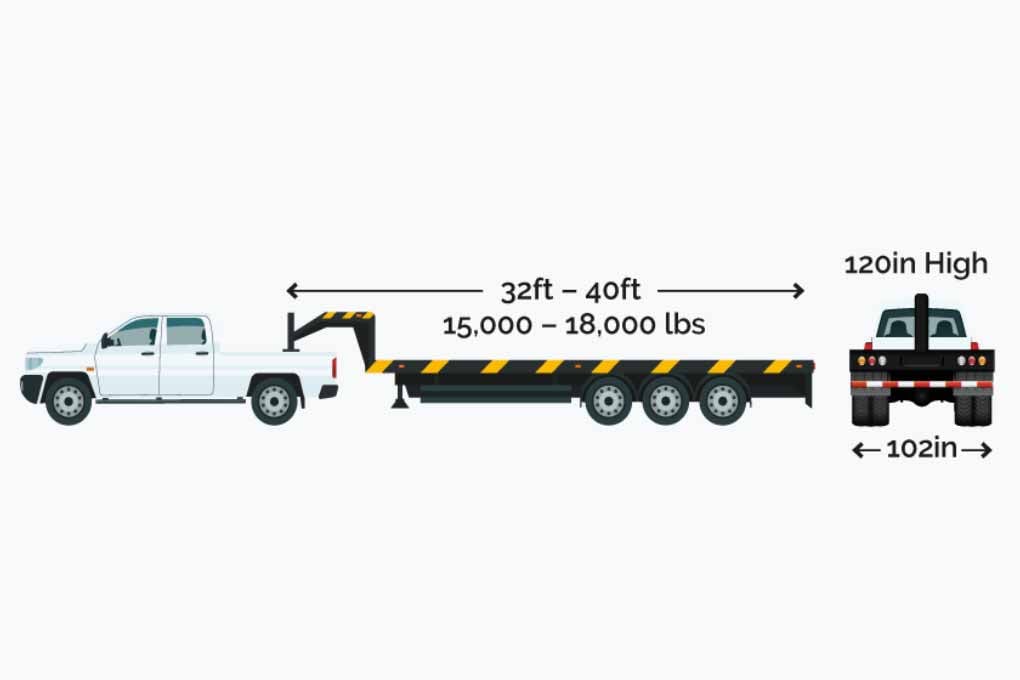
#1
5/5
50000
24/7
Frequently Asked Questions
What is flatbed trucking?
Flatbed trucking involves transporting freight on a truck trailer that has a flat, open deck with no sides or roof. A flatbed truck (usually a semi-truck pulling a flat platform trailer) can carry oversized and irregularly shaped loads that wouldn’t fit in an enclosed trailer. For example, flatbeds haul things like machinery, construction steel, lumber, and equipment that can be loaded by crane or forklift from the side. Flatbed trucking is widely used due to its versatility – it makes up a significant portion of commercial trucking because so many types of cargo require an open trailer. In flatbed trucking, the freight is secured with straps, chains, and sometimes tarps, but it remains exposed during transit. This type of trucking is essential for industries that need to move heavy or unwieldy items efficiently.
In the context of expedited freight, flatbed trucking plays a key role in urgent deliveries. When time-sensitive cargo is too large for standard box trucks, an expedited flatbed shipment is the solution. The flatbed truck is dispatched immediately to pick up the load and then drives straight to the destination. Because the trailer is open and accessible, loading and unloading can happen quickly, which further speeds up the overall delivery. Essentially, flatbed trucking marries heavy-haul capability with fast response, ensuring even oversized freight can be delivered within tight deadlines.
What is hot shot flatbed trucking?
“Hot shot flatbed trucking” is a term that combines hot shot trucking and the use of flatbed trailers. Hot shot trucking generally refers to expedited freight deliveries of relatively smaller loads using medium-duty trucks (like pickups with trailers or small flatbed trucks) instead of full-size 18-wheeler rigs. It originated in the oilfields, where pickup trucks with gooseneck flatbed trailers would rush deliver parts to drilling sites. Today, hot shot flatbed trucking means using a smaller, agile truck and flatbed trailer to haul urgent freight, often for a single customer, directly to its destination. These hot shot setups can carry loads that are too large for a van (for instance, large machinery, pallets of materials, or construction equipment) but don’t require a full 53-foot semi trailer.
Hot shot flatbed trucking is a fast and flexible solution. Because the truck-and-trailer combo is lighter and more nimble than a typical tractor-trailer, hot shot drivers can often drive faster (within legal speed limits) and reach remote or urban locations more easily. They handle a variety of trailer types, like gooseneck flatbeds, dovetail trailers, or small drop-deck trailers. This service is as much about timing as it is about the equipment – hot shot flatbed loads are usually on a tight deadline, so the driver often heads out as soon as the cargo is loaded and goes straight through to delivery. In sum, hot shot flatbed trucking is one method of expedited ground transport, merging the advantages of flatbed capacity (hauling oversized items) with the on-demand nature of hot shot service. It’s ideal for shippers who have a last-minute or emergency shipment that’s too big for a box truck but still needs to get there now.
How fast can expedited ground shipping deliver a load?
Expedited ground shipping can deliver a load very quickly – often much faster than standard freight services. The exact speed depends on the distance and whether drivers work in shifts, but the model is geared toward minimizing transit time. For shorter regional routes (a few hundred miles), expedited ground shipments via truck can often be delivered the same day or overnight. For longer cross-country routes, many expedited services use team drivers (two drivers in one truck) so that one can rest while the other drives, allowing the truck to keep moving almost continuously. This means a flatbed truck carrying an expedited load can cross thousands of miles in a couple of days, far quicker than a typical freight schedule. For example, a trip that might take three to five days with normal shipping could potentially be done in one and a half to two days with an expedited team-driver setup.
Unlike regular shipping, which might wait for a truck to be fully loaded or follow a multi-stop route, expedited shipping is direct. As soon as your freight is loaded, the truck departs and heads straight to you. Drivers are instructed to take the fastest safe route, only stopping for necessary breaks or fuel. Many expedited ground freight providers also take advantage of dispatch centers that operate 24/7, so a truck can be on the road within an hour of your request, even late at night. In summary, expedited ground shipping aims to deliver as quickly as physically possible while complying with safety and hours-of-service laws. It’s not instant teleportation, but it’s the fastest you can realistically move freight by land – often achieving next-day delivery even for shipments that are several states away.
What types of cargo are shipped on flatbed trucks?
Flatbed trucks are used to ship a wide variety of cargo, especially items that are oversized, heavy, or awkwardly shaped. Because the trailer bed is open and accessible from all sides (and above), flatbeds are ideal for freight that cannot be loaded into a standard box trailer. Common types of cargo shipped on flatbed trucks include:
-
Construction materials: Lumber, steel beams, rebar, trusses, concrete pipes, scaffolding, and prefabricated building components are often moved on flatbeds. These items are long or wide and are easily lifted onto a flatbed at a construction site or lumber yard.
-
Heavy machinery and equipment: Industrial machines, generators, HVAC units, tractors, excavators, and other large equipment are frequently transported by flatbed. They might be driven or craned onto the trailer. Flatbeds can also carry vehicles like cars, trucks, or military vehicles when needed.
-
Infrastructure components: Items such as utility poles, transformers, wind turbine blades, storage tanks, and large pipes (e.g., for oil and gas or water projects) ship on flatbeds due to their size. For example, you’ll often see flatbed trucks hauling long pipeline sections or oversized wind energy components.
-
Manufacturing and factory parts: Large engine parts, boilers, factory assembly line modules, or oversized molds and dies are transported via flatbed to facilities. When a factory needs a replacement part that’s too big for a crate, a flatbed does the job.
-
Freight containers and palletized goods: Flatbeds can also carry standard intermodal containers or big batches of palletized goods if needed. Sometimes, if a load is light but bulky (like large crates or big sacks of material), shippers use a flatbed for quick loading and unloading.
Overall, flatbed truck freight tends to be things that either exceed the dimensions of an enclosed trailer or would be very inefficient to load in one. By using chains, straps, and tarps, flatbed carriers secure all kinds of freight for safe transport. In expedited scenarios, the types of cargo don’t change, but the urgency does – for instance, rushing a replacement bulldozer to a mine, or delivering steel beams overnight to keep a construction project on schedule. Flatbeds give the flexibility to handle these critical shipments, whatever they may consist of.
What is the difference between a standard flatbed and a step-deck trailer?
A standard flatbed trailer has a level deck that sits about 5 feet off the ground, which limits the maximum cargo height to around 8–9 feet before oversize permits are needed. A step-deck trailer, also called a drop-deck, features a lower deck that drops down behind the tractor, sitting closer to the ground. This design allows taller freight—such as machinery, prefab structures, or stacked equipment—to be transported without exceeding legal height limits. Step-decks also make loading heavy items easier since the deck is lower to the ground, which reduces the angle for ramps or forklifts.
When should I use a flatbed truck for freight?
You should consider using a flatbed truck for freight whenever your shipment won’t easily fit into a standard enclosed trailer (like a dry van) or when loading/unloading needs special flexibility. Here are some situations where a flatbed is the right choice:
-
Oversized or over-dimensional loads: If the freight is wider, taller, or longer than a typical trailer’s interior (approx. 8.5 feet wide, 8 feet tall, 53 feet long), a flatbed is necessary. For example, large machinery, fabricated structural pieces, or large-diameter pipes require flatbeds.
-
Heavy weight: Flatbeds can often handle heavy loads (up to ~48,000 lbs on a standard 53’ flatbed). If your freight is extremely heavy and dense, a flatbed truck or specialized flatbed trailer might be needed for the weight capacity.
-
No loading dock at pickup or drop-off: If either location lacks a dock or forklift access only from the side, flatbeds make loading possible. For instance, delivering equipment to an open construction site is much easier with a flatbed since cranes or telehandlers can lift the cargo off from the side.
-
Freight that must be loaded by crane: Any item that needs to be hoisted by a crane onto the truck (such as a large HVAC unit or sculpture) will require an open top – hence, a flatbed.
-
Multiple stop deliveries of large items: If you need to pick up or drop off large items at different locations, a flatbed allows easier on-and-off loading at each stop compared to squeezing things into a trailer.
-
Fragile or awkward shapes: Sometimes an oddly shaped item might technically fit in a dry van but would be hard to maneuver through the doors or risk damage. A flatbed’s open platform can be safer for such cargo, as it can be gently placed without navigating a narrow door.
In summary, use a flatbed truck whenever the dimensions, weight, or handling requirements of your freight dictate it. If you’re unsure, a logistics provider can confirm if your load requires a flatbed. And of course, for urgent shipments meeting those criteria, an expedited flatbed service is the way to go. It ensures you get the benefit of the flatbed’s capacity and the speed needed for critical timelines.
Is expedited flatbed shipping more expensive than regular shipping?
Expedited flatbed shipping does cost more than standard shipping due to the premium service it provides. When you request an expedited shipment, you are essentially paying for dedicated resources and priority handling:
-
Dedicated truck & driver: Unlike regular shipping where your freight might share space on a truck with other loads, expedited service uses a truck just for you (especially for full truckload or large items on a flatbed). The carrier cannot pick up additional freight to offset costs, so you bear the full cost of the trip.
-
Immediate dispatch: Expedited carriers often have to position a driver quickly or even send a team of two drivers. This sometimes means paying drivers for extra hours or nighttime driving and compensating for quicker turnaround. Those costs are factored into the rate.
-
Faster transit: In some cases, expedited shipments might involve toll roads, express routes, or simply the opportunity cost of not using the truck for any other business until your load is delivered. It’s a premium service much like next-day air is versus ground mail.
How much more expensive can vary widely. As a rough idea, an expedited ground shipment might be priced at maybe 50-100% higher than standard transit for a similar lane, but it really depends on distance and urgency. For very long distances, sometimes expedited trucking with team drivers can approach the cost of air freight (though still usually cheaper than air for heavy freight). If your shipment is very heavy or oversize, the cost difference between expedited and regular might be smaller percentage-wise, because heavy haul rates are already high due to the equipment and permits, etc.
How do flatbed trucking companies keep freight secure and safe?
Flatbed trucking companies take several measures to ensure freight is secure and safe throughout transit, despite the cargo being exposed on an open deck. The process generally involves:
-
Proper loading and balancing: Experienced drivers or loading crews make sure the weight of the freight is distributed evenly on the trailer and positioned correctly over the axles. This balance is crucial for stability – an unbalanced load can cause handling issues. Heavier items are usually placed in the center, and weight is evenly spread side-to-side.
-
Heavy-duty securement: Once the cargo is in position, it’s fastened down using straps, chains, binders, and other securement devices. The U.S. Department of Transportation has strict regulations for how freight must be tied down on flatbeds. For lighter or delicate items, thick nylon web straps with ratchets are commonly used, while very heavy steel or machinery might be secured with steel chains. Flatbed drivers are trained in these techniques and often carry a variety of strap lengths and chain binders to accommodate different cargo.
-
Edge protectors and padding: To prevent straps from damaging the cargo (or sharp cargo edges from cutting straps), drivers use edge protectors, rubber mats, or padding at contact points. This not only protects the freight’s finish but also ensures the tie-downs remain tight and effective.
-
Tarping: If the freight could be harmed by weather (rain, snow, dust) or if privacy/security is a concern, tarps are used to cover it. Tarping is an art in flatbed trucking – heavy-duty waterproof tarps are draped over the load and secured so that wind can’t catch them. Tarps keep the elements off the cargo and also prevent any debris from flying off the load. For example, machinery with sensitive components or pallets of product are often tarped for protection.
-
Frequent en-route checks: Flatbed drivers will stop periodically (often after the first 50 miles and then every few hours) to inspect the load. They check that the straps/chains are still tight, adjust anything that has shifted, and re-tension the securements as needed. These regular check-ups ensure that nothing has come loose due to road vibration or wind.
-
Specialized equipment and accessories: Flatbed companies have additional tools like bulkhead frames (headboards), which prevent forward movement of cargo, and sometimes side kits or conestoga (rolling tarp systems) that can enclose the trailer if needed. Some loads also require escort vehicles and permits if they are oversize – in those cases, safety measures include defined routes and support cars to warn other drivers, which the flatbed company coordinates with authorities.
Through these practices, flatbed carriers maintain a strong safety record. Even though the freight isn’t inside a van, it is firmly secured to the trailer. A well-secured load should essentially become one with the flatbed, not shifting at all even during sudden stops or turns. Reputable flatbed trucking companies train their drivers extensively on load securement and invest in quality equipment, because safety of the cargo (and everyone on the road) is a top priority.
What are the dimensions and capacity of a flatbed trailer truck?
A standard flatbed trailer (the kind typically pulled by a semi-truck) has some common dimensions and capacities:
-
Length: Most flatbed trailers are 48 feet long. There are also extended flatbeds of 53 feet. Some specialized flatbed trailers can be shorter (for hot shots, common lengths are 20–40 feet) or much longer in the case of stretch trailers, but 48–53 ft covers the typical range.
-
Width: The maximum legal width for any road trailer in the U.S. is 8.5 feet (102 inches), and flatbeds adhere to this. The deck is usually about 102 inches wide of usable space.
-
Deck height: The deck (bed) of a standard flatbed sits about 5 feet (60 inches) off the ground. This is important because it affects the height of cargo you can load (taller cargo means a higher overall vehicle height).
-
Height limit for cargo: In general, the combined height of the flatbed deck plus the cargo cannot exceed 13.5 to 14 feet in most states (that’s the legal road limit for total vehicle height). Since the flatbed is ~5 feet high, that leaves about 8 to 9 feet of vertical cargo space before permits are needed. However, if using a special lowboy or step-deck flatbed, the deck might be lower to allow taller cargo.
-
Weight capacity: A typical flatbed trailer can carry up to around 48,000 pounds of freight, provided the weight is distributed properly and the truck’s axle limits aren’t exceeded. This is similar to other full-size trailers. Some flatbeds, like double-drop or multi-axle trailers, are designed for heavier loads (they can handle well above 48k lbs, but those are specialized use-cases and require permits).
Beyond these standard specs, there are variations of flatbed trailers:
-
Step-deck (drop-deck) trailers: These have a lower deck that drops down a couple of feet after clearing the truck tractor, which allows taller cargo (they might have a top deck height of 5 ft and a lower deck height of 3 ft, for example).
-
Double drop and Lowboy trailers: These are used for extremely tall or heavy loads (like industrial equipment or construction machinery). A lowboy might have a deck just 1–2 feet off the ground and often two drops (front and back) so the middle is very low.
-
Removable gooseneck (RGN) trailers: These allow very heavy equipment to be driven on, and they can carry huge weights well above 50,000 lbs.
-
Hot shot flatbed trailers: Usually smaller trailers pulled by pickups, often 20-40 feet long, with weight capacity in the range of 10,000 to 20,000 lbs depending on the setup.
For most expedited flatbed shipments, we’re looking at the standard 48’ or 53’ flatbed because it offers the most versatility. To summarize: a flatbed semi-truck with a 48’ trailer can haul roughly 48k pounds, with deck space 8.5 feet wide by 48 feet long, and can handle most large loads that fall within those dimensions. Anything beyond that (longer, heavier, or taller) might require special trailers and permits for an oversize load, which flatbed carriers can also provide with the appropriate equipment.
Is expedited flatbed trucking always more expensive than air freight?
Not necessarily. While expedited flatbed trucking is more costly than standard ground service, it can be significantly more economical than chartering an aircraft—especially for heavy, bulky, or oversized freight. Air cargo pricing increases sharply with weight and dimensions, whereas flatbed trucks can handle up to 48,000 pounds at a more predictable cost structure. For regional or cross-country urgent deliveries, flatbed expedited service often provides the best balance of speed and cost-effectiveness.
How do carriers handle oversize or wide loads on flatbed trucks?
Carriers handle oversize or wide loads on flatbed trucks with special procedures, permits, and equipment to ensure the load is transported safely and legally. Here’s how the process works for those giant loads that are beyond normal dimensions:
-
Permitting: An oversize load is typically defined as anything exceeding standard legal size limits (8.5 feet wide, around 13.5 feet tall, 53 feet length, or over 80,000 lbs gross vehicle weight, though weight has its own axle-based rules). To move such a load, carriers must obtain oversize/overweight permits from each state the route passes through. These permits specify the allowed travel times (often daylight hours on weekdays, avoiding holidays), specific route, and any special requirements (like escort vehicles). Carriers usually have compliance specialists who arrange all permits in advance of the trip.
-
Route planning: Not all roads can accommodate big loads – low bridges, narrow lanes, or sharp turns can be problematic. Using mapping tools and state-provided route guidance, carriers map out a path that can handle the height/width and weight. This might mean a longer route to avoid obstacles. For especially tall loads, the route may avoid low overpasses or require checking clearances manually. For heavy loads, certain bridges or roads might be off-limits. Planning is critical and often dictated by the permit.
-
Escort vehicles (pilot cars): Many oversize loads require escort vehicles to warn other motorists and assist the truck. For wide loads (e.g., over 10 or 12 feet wide, depending on state), usually one or two escort cars are used – one in front and one behind – with bright signs and flags indicating “Oversize Load”. These pilot cars help block lanes for the truck to maneuver and alert the truck driver to upcoming hazards. Very tall loads might also travel with a pole car (an escort with a height pole that goes ahead to ensure upcoming overhead clearances are sufficient).
-
Safety equipment: The flatbed trailer carrying an oversize load will be outfitted with warning flags, usually red or orange flags on the edges of the load, to make it more visible. They also have “Oversize Load” banners on the front of the truck and back of the trailer. At night, if permitted to run, they might use amber warning lights. The load itself is thoroughly secured (even more straps/chains as needed due to its size). If part of the load overhangs the trailer, that section gets flagged and possibly supported by additional equipment (for example, a long steel beam might have a dolly or steering axle attached to the back end if it’s extremely long).
-
Specialized trailers: For oversize loads, carriers might use specific types of flatbeds or modular trailers. For example, very long items could go on extendable flatbeds or beam trailers. Very heavy equipment might go on multi-axle lowboy trailers that spread the weight. Some loads even require dual-lane trailers (which are basically two trailers side by side for extra width and weight distribution). The choice of trailer is part of handling oversize freight – carriers will select a configuration that can safely carry the load’s weight and size.
-
Experienced drivers: Handling an oversize flatbed load isn’t for every driver. Carriers assign their most experienced drivers who are specially trained in oversize hauling. These drivers know how to make wide turns, deal with traffic, and coordinate with escort vehicles. They drive at slower speeds for safety and maintain constant communication with their escorts via radio.
Overall, moving an oversize load is a carefully orchestrated operation. From getting the proper permits to planning the route and using escort teams, carriers leave nothing to chance. The emphasis is on safety and compliance, because oversize loads, like a huge piece of industrial equipment or a prefab home, can pose risks if not handled correctly. By following regulations and employing the right support, flatbed trucking companies successfully transport oversize freight regularly. So if you have something gigantic that needs to get somewhere fast, rest assured that an experienced expedited carrier can manage it – it just might travel with a bit of a convoy and a lot of preparation behind the scenes.
Can flatbed trucks deliver to remote job sites or off-road locations?
Yes, flatbed trucks are well-suited to deliver to remote job sites or off-road locations, and this is actually one of their strong advantages. Many remote locations – such as oil and gas drilling sites, wind farms, mining operations, or rural construction projects – lack the infrastructure (like paved roads or loading docks) that standard delivery trucks usually require. Flatbed setups, especially when using heavy-duty pickup trucks or all-wheel-drive tractors with flatbed trailers, have more flexibility in reaching these tough locations:
-
Mobility: A smaller hot shot flatbed (for example, a one-ton pickup with a gooseneck flatbed trailer) can navigate dirt roads, narrow paths, and sharp turns better than a big 53’ semi-trailer. Even a full-size flatbed semi, if operated by an experienced driver, can often reach construction sites by carefully driving on graded dirt or gravel roads.
-
Off-loading ease: Because flatbeds can be loaded/unloaded from any side, they are ideal for places where you might only have a crane or rough-terrain forklift on site to unload. The truck can position itself in an open area and the site crew can unload the equipment or materials directly. There’s no need for a loading dock or to maneuver a big box truck into a tight space – one can simply pick the cargo right off the flatbed.
-
Ruggedness: Many flatbed carriers that serve industries like oil & gas or mining equip their trucks with features for rough terrain (like off-road tires on their tractor units, or they choose flatbed trailers that are a bit shorter for easier handling). The nature of the freight (pipes, machinery, etc.) often means these trucks are used to being in less than ideal road conditions. They can often get much closer to the “front line” of a job site than a typical freight truck could.
-
Permits and access: If the site is truly off public roads (say, 10 miles into a large ranch or a winding logging road), the carrier will ensure the driver has permission to enter and clear instructions on how to reach it. Sometimes they coordinate with site managers to have an escort guide the truck in for the final stretch. But rest assured, this is routinely done – think of how heavy equipment like drill rigs or transformers get delivered to the middle of nowhere; it’s via flatbed trucks with careful driving.
-
Experience with remote deliveries: Expedited flatbed services regularly handle emergency calls to remote areas (a downed cell tower in a mountain region, a power generator needed on an island reachable by causeway, etc.). The drivers are used to less-than-perfect roads. As long as the terrain is passable by a heavy truck and trailer, they will get there. In extreme cases, if a semi can’t reach directly, smaller trucks or even off-road vehicles can be employed for the last leg, but those are special scenarios.
How much does it cost to hire a flatbed truck?
The cost of a flatbed shipment depends on several factors, including distance, weight, dimensions, type of trailer required, and urgency. Standard flatbed rates are often quoted per mile, with oversize or overweight freight requiring extra permits and sometimes escort vehicles, which increase costs. Expedited flatbed trucking typically carries a premium because a truck is dispatched immediately and dedicated exclusively to your load. While the price is higher than standard shipping, it is often far less costly than the downtime or missed deadlines that can result from delays.
Why is flatbed trucking important for emergency shipments?
Flatbed trucking plays a critical role in emergency logistics because it can move large, heavy, or irregularly shaped cargo directly to the point of need. For example, when a power plant requires a replacement transformer or a construction site runs out of steel beams, an expedited flatbed shipment can prevent costly downtime. Unlike enclosed trailers, flatbeds allow for rapid side or overhead loading, meaning emergency cargo can be dispatched quickly with minimal preparation. By offering both capacity and speed, flatbed trucking ensures that critical industries can recover from unexpected disruptions without long delays.
Can flatbed trucks be used for international shipments?
Flatbed trucks are commonly used for cross-border shipments within North America, particularly between the U.S., Canada, and Mexico. Carriers experienced in international logistics handle customs paperwork, permits, and coordination with partner fleets to ensure seamless cross-border transit. Flatbed trailers are ideal for transporting oversized equipment, machinery, or materials that can’t easily move by container, making them an important mode of transport for international supply chains.
From critical shipments to ongoing support, see why businesses continue to choose HotShotTrucking.com






